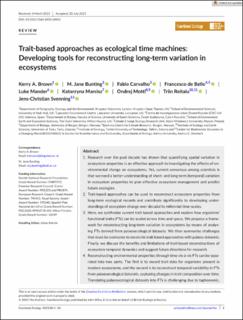Trait-based approaches as ecological time machines: Developing tools for reconstructing long-term variation in ecosystems
Brown, Kerry A.; Bunting, M. Jane; Carvalho, Fabio; de Bello, Francesco; Mander, Luke; Marcisz, Katarzyna; Mottl, Ondrej; Reitalu, Triin; Svenning, Jens-Christian
Journal article, Peer reviewed
Published version

Åpne
Permanent lenke
https://hdl.handle.net/11250/3092353Utgivelsesdato
2023Metadata
Vis full innførselSamlinger
- Department of Biological Sciences [2235]
- Registrations from Cristin [9791]
Sammendrag
Research over the past decade has shown that quantifying spatial variation in ecosystem properties is an effective approach to investigating the effects of environmental change on ecosystems. Yet, current consensus among scientists is that we need a better understanding of short- and long-term (temporal) variation in ecosystem properties to plan effective ecosystem management and predict future ecologies.
Trait-based approaches can be used to reconstruct ecosystem properties from long-term ecological records and contribute significantly to developing understandings of ecosystem change over decadal to millennial time-scales.
Here, we synthesise current trait-based approaches and explore how organisms' functional traits (FTs) can be scaled across time and space. We propose a framework for reconstructing long-term variation in ecosystems by means of analysing FTs derived from palaeoecological datasets. We then summarise challenges that must be overcome to reconcile trait-based approaches with palaeo-datasets. Finally, we discuss the benefits and limitations of trait-based reconstructions of ecosystem temporal dynamics and suggest future directions for research.
Reconstructing environmental properties through time vis-à-vis FTs can be separated into two parts. The first is to record trait data for organisms present in modern ecosystems, and the second is to reconstruct temporal variability in FTs from palaeoecological datasets, capturing changes in trait composition over time. Translating palaeoecological datasets into FTs is challenging due to taphonomic, taxonomic and chronological uncertainties, as well as uniformitarian assumptions. Explicitly identifying and addressing these challenges is important to effectively calculate changes in FT through time.
Palaeo-trait research offers insights into questions related to short- and long-term ecosystem functioning, environmental change and extinction and community assembly rules across time. As work in this area matures, we expect that trait-based approaches integrating palaeoecology and neo-ecology will improve understanding of past ecologies and provide a deeper insight of their implications for present-day and future ecosystem management and conservation.
